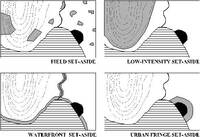- England
- Scotland
- France
- Holland
- Germany
- Italy
- Spain
- Portugal
- USA
- China
- Japan
- India
- Iran
- Advice
- Gardens
- England
- Scotland
- France
- Holland
- Germany
- Italy
- Spain
- Portugal
- USA
- China
- Japan
- India
- Iran
- Advice
- Garden Tours
Book: Landscape Planning and Environmental Impact Design: from EIA to EID
Chapter: Chapter 7 Agriculture, farming and countryside policy
In times of glut, it should be done for non-agricultural reasons. That land benefits from being fallowed was one of the great discoveries of the eighteenth century agricultural revolution. This background influenced the adoption of state-funded fallowing policies to deal with the surplus of agricultural produce, in the developed countries, in the second half of the twentieth century. The policy is described as 'set-aside' in Britain, 'land diversion' in America and 'fallowing' in other countries. British farmers are invited to 'set aside' a proportion of their land for a period of time. Payments are made for not farming the land. The set aside field becomes a source of weeds while the intensity of production is raised on the remainder of the farm. If the land is fallowed for at least five years, it is described as a non-rotational set aside and may yield some benefit to wild life (Firbank, 1993). Because of their history, fallowing policies are applied at the farm scale. But there are alternatives [Fig 7.14]. 7.14 In choosing which land to fallow, or set-aside, there are a number of policy alternatives: one could set aside ('fallow') individual fields or less-productive land; or waterfront land (of high scenic quality) or land near towns (for recreation and amenity). Mostly, the choice was left to farmers - which minimised the possible contribution to the stock of public goods. Since fallowing was originally intended to raise agricultural output, it can hardly be the correct policy for countries which now seek to reduce agricultural output. Instead, fallowing should be done, for non-food objectives, at the scale of a watershed, a region, a country or a continent. One could set aside: land on the urban fringe; land in stream valleys; low-intensity farming land; greenway land; nature conservation land; forest land; recreation land; coastal land. On the urban fringe, the money being squandered on fallowing could be used to create a wonderful footpath and greenway network. The money would still go farmers, for strategic or social reasons, but the public would gain something in return. If the only aim is output-reduction, resort could be made to the LRP, the LLS and the UDA: a Late Riser Premium, starting with a payment to those who stay in bed until 9 am and rising to a maximum for those who undertake to lie in until 1 pm 7 days a week; a Liquid Lunch Supplement, for those who consume 3 litres of beer at lunchtime; and a Useless Dog Allowance for those who exchange a sheep dog for a Chihuahua (Farming Programme, 1990).
